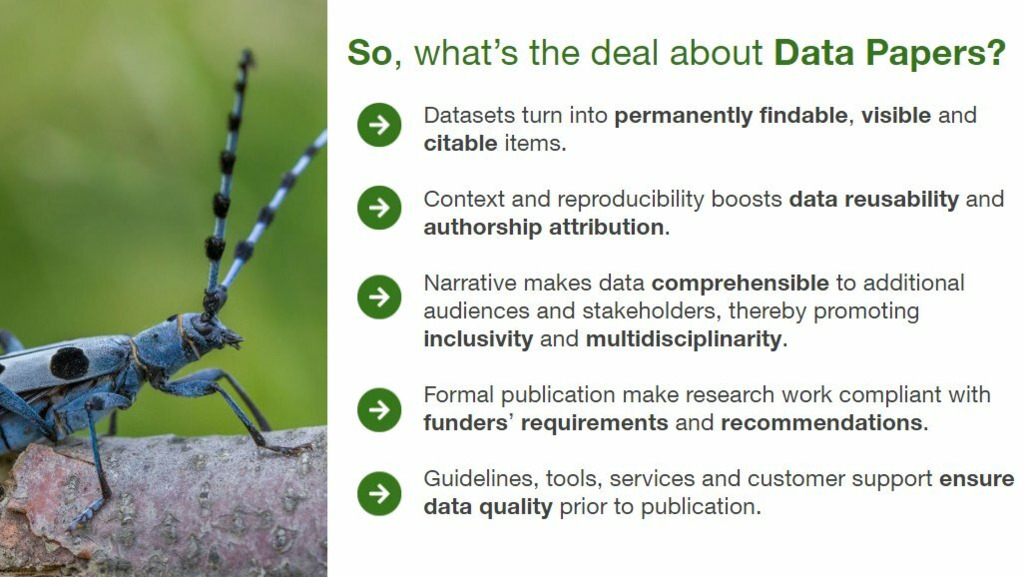In an EVENTful March, BDJ served as an Open Data example on two occasions

In mid-March, Biodiversity Data Journal (BDJ) was presented to attendees at both the 2023 Open Research Week and the 3rd Global Soil Biodiversity Conference (GSB 2023).
At both events, the journal’s team demonstrated how the flagship scholarly journal - published by Pensoft and powered by ARPHA Platform - serves scientists as a means to make their research data open, inclusive and reusable, while receiving the appropriate credit for their work.
Twice this month, the rationale behind the launch of the journal, which happened exactly 10 years ago, was made crystal clear. Ever since day #1, BDJ’s mission has been to:
- Аccelerate publishing, dissemination and sharing of biodiversity-related data.
- Make small data big by freeing datasets from specialised aggregators (e.g. GBIF, DataONE).
- Ensure research stands scrutiny beyond peer review.
See highlights from both the 2023 Open Research Week (#OpenResearchWeek) and the GSB 2023 (#GSB2023) conferece on Twitter via the dedicated event hashtags.
***
On Monday, 15 March, at the “Is This the Moment for Data Journals?” session within the annual Open Research Week event, which once again took place entirely online, BDJ’s Editor-in-Chief Dr. Vincent Smith joined Dr. Barbara McGillivray (E-i-C of the Journal of Open Humanities Data) in a discussion on the aims, use and advantages of data journals across different scientific fields.
“So, we realised there was a big problem in terms of data sharing in biodiversity, and we wanted to address the issues on better quality data. Now, we've been publishing data already for 10 years,” said Vince in a presentation, which we also followed on Twitter, when looking back at the launch of the BDJ back in 2013.
***
Two days later, on the final day of the 3rd Global Soil Biodiversity Conference, organised by the Global Soil Biodiversity Initiative and hosted by the University College Dublin in Ireland, Pensoft’s Iva Boyadzhieva took part in a workshop, organised by the Global Biodiversity Information Facility (GBIF) and dedicated to data solutions designed to address soil biodiversity gaps across scales.
In her talk, Iva explained how BDJ provides a technologically advanced scholarly workflow to prompt high-quality and reusability for openly and publicly available biodiversity data.
When authors of biodiversity data opt to add narrative to describe their datasets in a publication in BDJ, their Data Paper manuscripts undergo both data audit and peer review, in order to assure the quality, reusability and citability of the data in the long run.
In addition, BDJ ensures that datasets published as Data Papers reach much further than their immediate audience of highly specialised experts. After all, the article format allows for the data to be provided within a context that can only be communicated by means of text and narrative.
“You can't expect from policy makers or even scientists in related - but different - fields to simply go on a specialised aggregator and seek out your dataset,” she pointed out.
“On the other hand, if that same dataset is part of a formally published scientific paper and available from a journal indexed in all those academic databases; if this paper is publicised on social and even traditional media, then it is a completely different story.”
***
Throughout the GSB 2023 conference - and especially after the GBIF workshop - the delegates were quite curious to find about the newly launched article collection in Biodiversity Data Journal, aptly titled Soil biodiversity, initiated in a collaboration by the Finnish Biodiversity Information Facility (FinBIF), GBIF and Pensoft.
There, authors are invited to submit data papers that describe datasets about soil organisms submitted to GBIF in 2023. Amongst the requirements is that the datasets need to contain at least 5,000 occurrence records, and that the studied taxa must be spending at least one of their life stages in soil.
***
You can find more information about the call for soil biodiversity data papers on the GBIF website. Keep in mind that the article waivers are only available for the first 40 papers submitted until 22 September 2022.
***
Don’t forget to also keep yourself updated with news from BDJ on Twitter and Facebook. You can also sign up for the journal newsletter from the BDJ homepage.